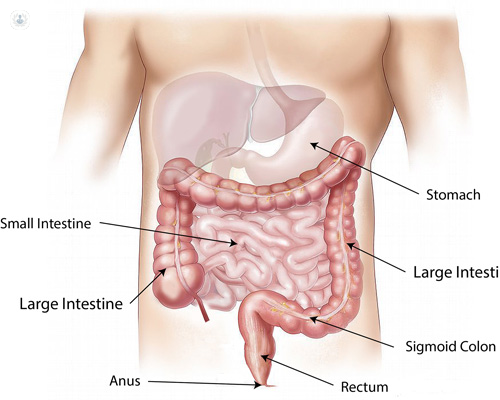Breaking the bowel cancer taboo
Escrito por:Bowel cancer is one of the most common cancers, but it is not openly talked about as much as it should be and people may not know the necessary simple things. Highly specialised colorectal surgeon Mr Alexander von Roon breaks the ice in this article and explains some basics and how important it is to seek a doctor.

What’s the most important thing people need to know about bowel cancer?
Bowel cancer is the third most common cancer in men and women in the UK – every year, around 42,000 people are diagnosed with it. According to statistics, males have a 1 in 15 lifetime risk of developing it and females have a 1 in 19 risk. If polyps are found and removed early enough at colonoscopy, bowel cancer is preventable.
What are the misconceptions surrounding bowel cancer?
Bowel cancer is more common than people think. People tend to feel uncomfortable talking about their bowels, so a bowel cancer diagnosis is not talked about publicly very much. For example, you can name the number of celebrities you know of with breast cancer and likely none you know of with bowel cancer.
Are people uncomfortable to seek prompt advice because of the stigma around the conversation?
Unfortunately, there are many people who are diagnosed late with bowel cancer because they feel too ashamed to talk about their symptoms with their doctor; this is more common with men. There is no need to feel embarrassed about talking to a doctor or nurse about your bowels – they are a normal part of our bodies, and you will not be met with any judgement or prejudice by sharing your symptoms with your doctor or nurse.
What do patients need to know about how bowel cancer progresses and spreads?
There are three ways that bowel cancer can spread. The first is by the lymphatics (and lymph nodes), second is via the bloodstream, and third is by the tumour directly extending into neighbouring organs. It most commonly spreads to the liver and lungs. Sometimes it can spread into the peritoneum (the membrane lining all the organs inside the abdomen) or the ovaries (this is known as a Krukenberg tumour). The most commonly used staging system for bowel cancer is the UICC (Union for International Cancer Control) TNM (Tumour, Node, Metastasis) system. In summary, the four stages of anatomical spread are as follows:
Stage I – the cancer is restricted to the bowel wall
Stage II – the cancer is not in the lymph nodes but has spread past the bowel wall
Stage III – the cancer has spread to the lymph nodes
Stage IV – the cancer has spread to other organs
Catching the cancer at a lower stage offers a better chance of curing the bowel cancer and the long-term outlook.
Which activities/diets/behaviours raise the risks of developing bowel cancer?
Smoking significantly increases the risk of bowel cancer. There is also some evidence that drinking excessive amounts of alcohol also increases the risk of bowel cancer. Eating too much red or processed meat and eating too little fibre are also associated with an increased bowel cancer risk, as is obesity (being overweight). People who exercise more and are physically active seem to have a reduced risk of bowel cancer.
What chances does a patient have of recovering from bowel cancer?
Recovery from bowel cancer is generally defined as being alive at five or ten years after the surgery – this is called ‘survival’. As a general rule, most patients who survive bowel cancer for five years without developing a recurrence of the cancer also do not develop a recurrence between five and ten years after the surgery. The chance of survival is related to the stage of the cancer at diagnosis. After surgery and chemotherapy, people with bowel cancer enter a five-year period called ‘surveillance’, where they have six monthly or annual blood tests and CT scans to check for any sign of the cancer coming back. During this surveillance period, it is hard to say that they have been ‘cured’ of bowel cancer. But if the cancer has not come back after five years, they can be more certain that they have been cured, and the surveillance is discontinued.
In the UK, people with stage I bowel cancer have a five-year survival rate of 90 per cent, and people with stage II bowel cancer have an 85 per cent five-year survival rate. The outlook is a little worse for people with stage III bowel cancer with 65 per cent five-year survival, and much poorer for those with stage IV bowel cancer at 10 per cent five-year survival. There is some evidence that more radical surgery (called complete mesocolic excision) is associated with lower rates of cancer recurrence (roughly 10 per cent lower), which might in time also translate to improved five-year survival, but it is also harder to perform and riskier. These factors need to be carefully balanced against the benefits, particularly in older people.
To discuss bowel cancer and related concerns, you can go to Mr von Roon's Top Doctors profile and schedule a consultation.



